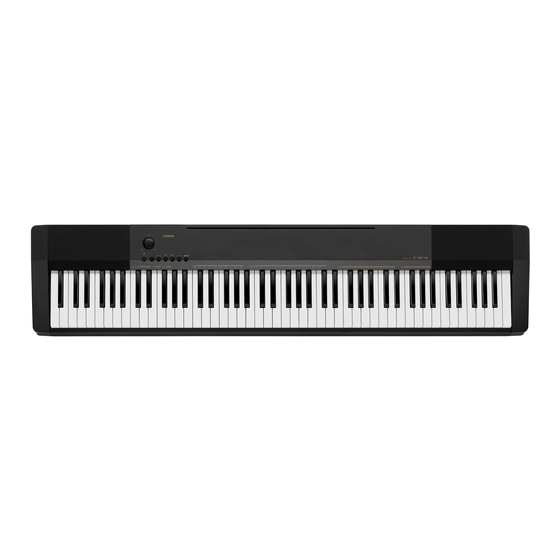Casio CDP-130 Manuel de l'utilisateur - Page 11
Parcourez en ligne ou téléchargez le pdf Manuel de l'utilisateur pour {nom_de_la_catégorie} Casio CDP-130. Casio CDP-130 20 pages.

Using Chorus
Chorus is a function that adds depth and breadth to notes. It
makes you sound as if you are playing multiple instruments.
1.
While holding down
CHORUS area of the keyboard to select a
chorus type.
There are five chorus types, plus an off setting.
• The actual effect produced by chorus depends on the
tone you are using.
The initial default chorus setting is OFF.
Changing the Pitch
(Transpose, Tuning)
Changing the Pitch in Semitone Steps
(Transpose)
The transpose feature lets you change the pitch, in semitone
steps. A simple operation lets you instantly change the pitch
to match that of a singer.
• The transpose setting range is –12 to +12 semitones.
The initial default transpose setting is 0.
4
, press a key within the
Playing the Digital Piano
1.
While holding down
plus (+) key within the TRANSPOSE area of the
keyboard to change the setting.
• Each press of a key increases or decreases the current
setting by 1.
• To return to the initial default setting, press the minus
(–) and plus (+) keys at the same time.
Fine Tuning (Tuning)
Use the tuning feature when you need to adjust the pitch
slightly to play along with another musical instrument. Also,
some artists perform their music with slightly altered tuning.
You can use the tuning feature to adjust tuning so it exactly
matches a performance on a CD.
• The tuning feature specifies the frequency of the A4 note.
You can set a frequency within the range of 415.5 to
465.9 Hz. The initial default setting is 440.0 Hz.
1.
While holding down
plus (+) key within the TUNE area of the
keyboard to change the tuning.
• Each press of a key increases or decreases the current
setting by 0.1 Hz.
• To return to the initial default setting (440.0 Hz), press
the minus (–) and plus (+) keys at the same time.
4
, press the minus (–) or
4
, press the minus (–) or
EN-9
